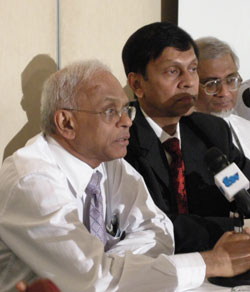
At the briefing |
|
Sri Lankan diaspora investments in government securities will be backed-up 100 % by a special ‘sinking fund,’ to eliminate credit risk to investors, the Central Bank said this week.
“We will have a separate sinking fund, up to 100% of the value of the diaspora funds. So for every dollar that comes in, we will put a dollar in the fund. The Central Bank will release foreign exchange from this fund, when people want to take back their money,” said Deputy Governor of the Central Bank, W A Wijewardena, speaking at the launch of the new investment scheme for the Sri Lankan diaspora, on Monday.
The Bank hopes to raise US$ 500 million this year by opening up government securities to around 1.5 million Sri Lankans living and working in foreign countries. Sri Lanka’s higher interest rates compared to other countries, are expected to generate investor interest and the government is addressing potential risk factors through the sinking fund.
The sinking fund is expected to reduce risks to investors at a time when the global economy is in a cash crunch and Sri Lanka’s foreign exchange reserves are under pressure. The special fund will be maintained in US dollars and will remove the risk of the government not having enough foreign exchange to pay out, when people want to cash-in their investments.
“Through this fund, we can assure people that we will always have enough foreign exchange to pay them back when they want to take their money back,” said Mr Wijewardena. The new diaspora investment is tax free, except for a 10% withholding tax at point of purchase of government securities, and can be encashed in foreign currency or rupees. The Central Bank will re-invest the money in the sinking fund in “triple A-rated foreign government t-bills and t-bonds,” so that the country earns interest out of it.
Reinvestment in reconstruction
Meanwhile, the rupee proceeds of the diaspora investments will go to finance reconstructing and rehabilitation of the North and East. The government has not officially come out with a cost estimate to rehabilitate the North and East, but the bill is expected to run into billions of dollars. At this point, with the armed conflict ending, the government must raise funds to de-mine lands and resettle and provide livelihoods for hundreds of thousands of war displaced people in the North and East. The government must also raise funds to rehabilitate war destroyed infrastructure like houses, schools, roads and basic health and sanitation facilities. In addition the government needs to find money to rehabilitate the Sinhala, Tamil and Muslim men, women and children disabled by war, that require special psychosocial care.
The government has already launched a 3 year programme for reconstruction in the East, called Negenahira Nawodaya (Eastern Revival) and a similar development programme is planned for the North, called the Uthuru Wasanthaya (Spring-time in the North).
To raise awareness about the investment opportunity and the financing needs, the Central Bank, on February 4 - Independence Day, started an international campaign in different countries.
Currency swaps
To preserve foreign exchange, the Central Bank will also use currency swaps, for US dollars, with Central Banks of other countries. Bank officials did not say what countries Sri Lanka will do currency swaps with, but said this will happen soon.
A currency swap is an agreement between two countries to exchange one currency, for another. After an agreed period of time the original amounts swapped, are given back.
Bonus on foreign currency accounts
The Central Bank is also encouraging inflows of foreign exchange by giving a 20% bonus payment on interest payments of RFC and NRFC accounts.
The bonus interest will be paid in rupees starting from February 1st . RFC and NRFC accounts opened before this time, with existing funds, are also eligible to receive the bonus payment.
In 2008, remittances totalled around US$ 3 billion. However, in 2009, remittances inflows are expected to reduce because of lower foreign employment opportunities and worker lay-offs in foreign countries, due to the global economic slow down.
|

